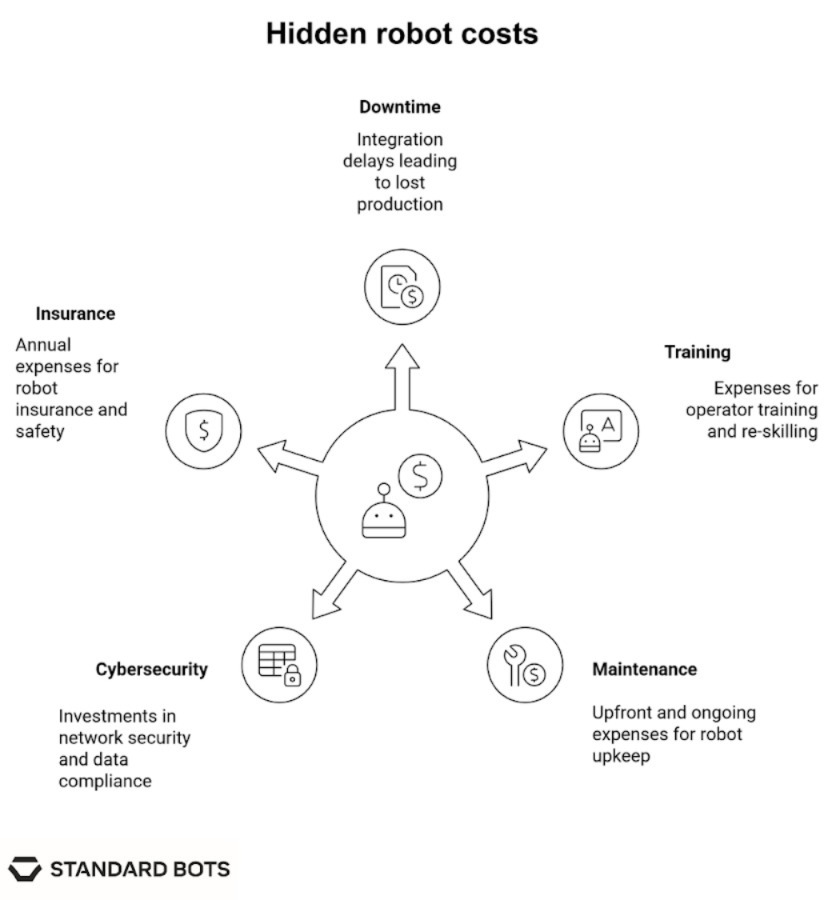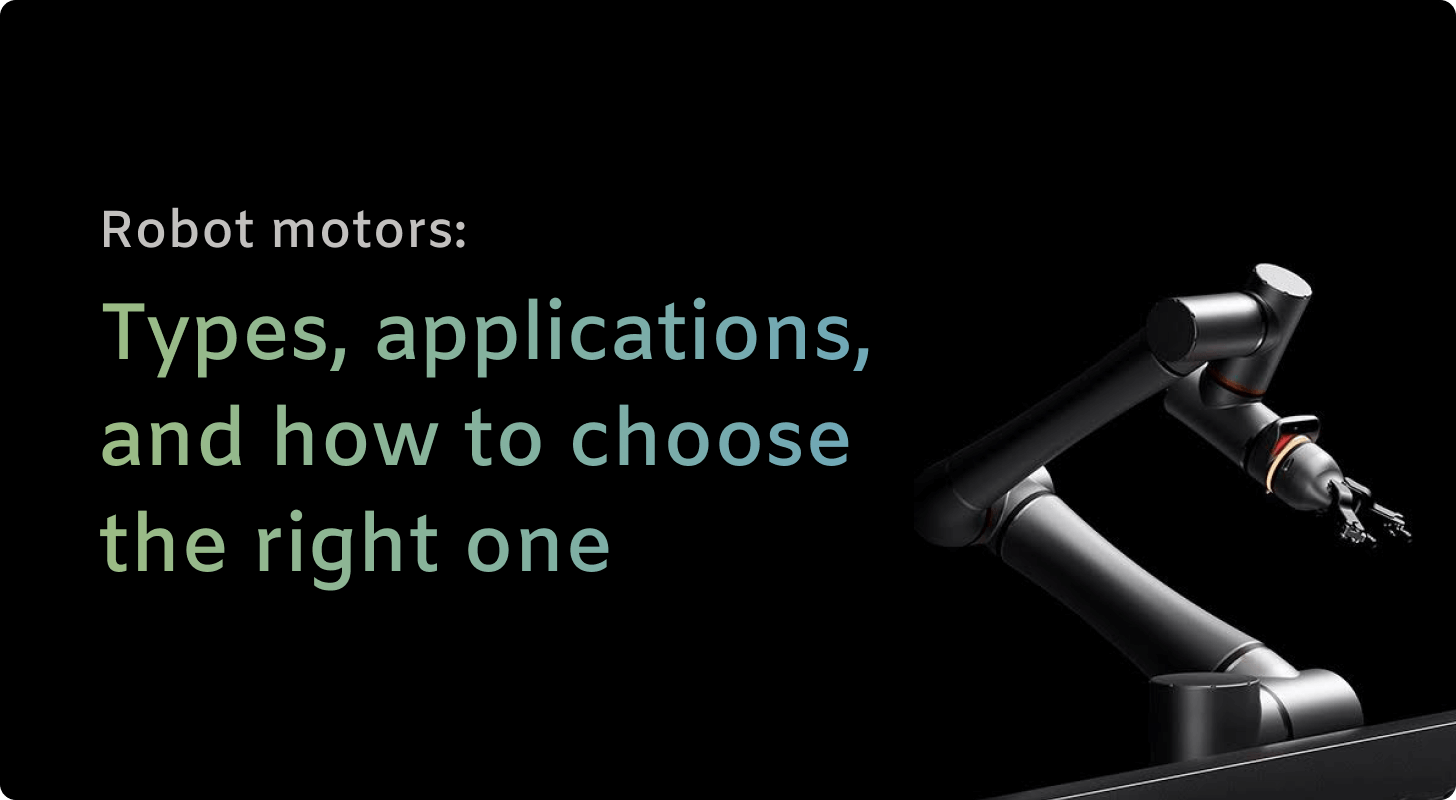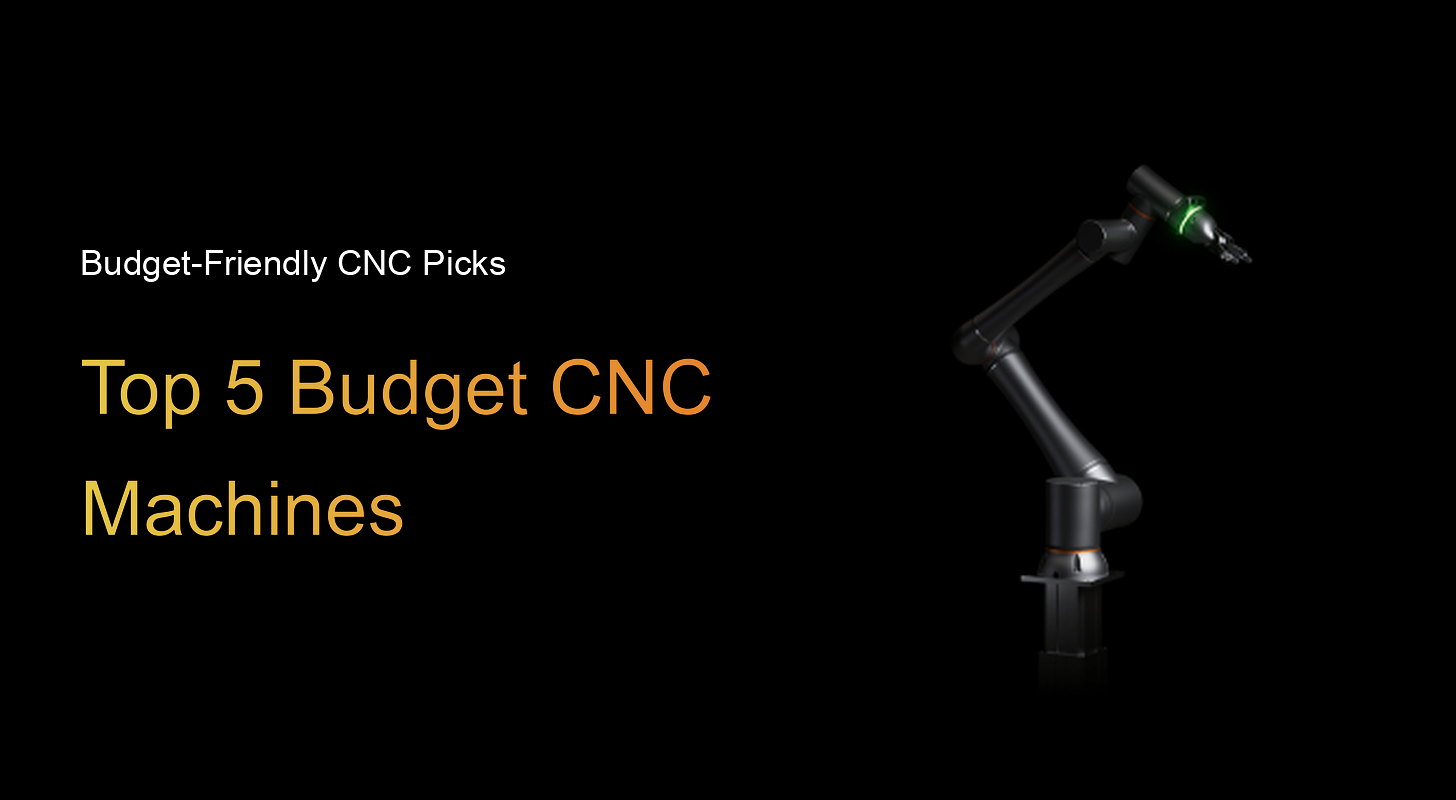Robot costs in 2026 range between $25K and $500K+. Costs vary widely based on type and complexity. A basic collaborative robot starts around $25,000, while full industrial automation systems can reach $500,000 or more. Advanced humanoid AI robots now sell for over $200,000.
Other factors like integration, training, end effectors, and ongoing support also impact the overall cost.
But modern cobots like RO1 are more affordable and easier to deploy than ever, and this makes automation accessible to businesses of all sizes.
What drives the cost of a robot?

The total investment depends on the hardware, software, integration, and support required for your specific application.
Hardware specifications impact base pricing
Payload is one of the biggest cost drivers. A robot that lifts 5 kg costs significantly less than one designed for 50 kg or more. Longer reach and tighter precision tolerances also push up costs, especially for high-speed or delicate tasks.
More axes and joints mean more flexibility and a higher price. Six-axis robots like RO1 offer a broader range and dexterity compared to simpler models. Built-in sensors for collision detection, force feedback, or safety add value but raise the base price.
Software and AI capabilities
Third-party vision systems for object detection, barcode reading, or alignment can add $10,000 to $30,000 to traditional robots. However, RO1 includes built-in vision at no additional cost.
AI capabilities like machine learning, adaptive motion, and error correction are becoming common in newer robots, but still come at a premium. Expect 20% to 40% higher pricing for models with AI features.
Installation and system integration
Traditional robot system integration can double your robot costs. It includes mounting, safety systems, conveyor links, and network compatibility.
Facility modifications like power upgrades, compressed air systems, and safety fencing can add $10,000 to $50,000 to your project. Turnkey solutions may cost more upfront but simplify deployment and reduce errors.
Training and support
Basic operator training ranges from $500 to $1,500, while comprehensive multi-day programming courses cost $2,000 to $5,000. For example, ABB charges $2,700 to $3,000 for standard 4–5 day robotics programming courses.
Ongoing support like software updates and remote diagnostics often costs 10–15% of the robot’s purchase price annually.
Customization versus off-the-shelf
Standard configurations cost less. Off-the-shelf robots like RO1 are built for immediate deployment with no extra engineering effort.
Custom builds, including custom grippers, mounts, or control logic, can raise the total cost by 25% to 100% depending on complexity.
How much do different types of robots cost?
Robot cost comparison table
1. Industrial robots (standard 6-axis arms)
Traditional industrial robots are the workhorses of manufacturing. These multi-axis systems handle welding, palletizing, machine tending, and heavy-duty applications.
Price range: $50,000 to $200,000+ for the robot alone
Popular models and pricing:
- Universal Robots UR10e: ~$50,000
- FANUC M-20iD: ~$75,000
- KUKA KR 10 R1100: ~$65,000
- ABB IRB 2600: ~$80,000
What drives the cost? Payload capacity (10–500 kg), reach (1–3+ meters), and precision requirements.
Welding robots cost more because of specialized controllers and safety systems.
Total system cost: $150,000 to $500,000, including integration, safety systems, and tooling.
2. Collaborative robots (cobots)
Cobots work safely alongside humans without safety fencing. They're easier to program and deploy than traditional industrial robots.
Price range: $25,000 to $75,000 for the robot
Popular models and pricing:
- Standard Bots RO1: $37,000 (list price)
- Universal Robots UR5e: ~$50,000
- Dobot CR10: ~$45,000
- Techman TM12: ~$55,000
What makes cobots cost-effective? Built-in safety features, intuitive programming, and faster deployment reduce total project costs. RO1 offers the best value with 18 kg payload, 1300 mm reach, and built-in vision.
Total system cost: $40,000 to $150,000, including tooling and basic integration.
3. AI-powered service robots
Service robots handle customer interaction, cleaning, delivery, and hospitality tasks. AI capabilities drive premium pricing.
Price range: $30,000 to $200,000+, depending on AI sophistication
Popular models and pricing:
- Amazon Astro: ~$1,000 (home use)
- Relay Robotics Relay+: ~$50,000 (hotel delivery)
- SoftBank Pepper: ~$20,000 (customer service)
- Boston Dynamics Spot: ~$75,000 (inspection/security)
AI features that increase cost: Natural language processing, computer vision, autonomous navigation, and machine learning capabilities can add $20,000 to $100,000 to base prices.
Total system cost: $50,000 to $300,000, including software licensing, training, and ongoing AI updates.
4. Humanoid robots
Humanoid robots remain largely experimental but are entering commercial applications. Limited availability keeps prices high.
Price range: $150,000 to $1,000,000+ for research or commercial units
Notable examples:
- Boston Dynamics Atlas: Not commercially available
- SoftBank Pepper: ~$20,000 (limited humanoid features)
- Tesla Optimus: Expected ~$20,000–$30,000
Why do humanoid robots cost so much? Complex mechanical systems, advanced AI, and limited production volumes. Most are still research platforms rather than commercial products.
5. Mobile robots and AGVs
Autonomous mobile robots handle material transport, warehouse operations, and logistics. Costs vary by navigation complexity and payload.
Price range: $25,000 to $150,000 per unit
Popular models and pricing:
- Boston Dynamics Spot: ~$75,000 (inspection or security)
- Amazon Kiva: ~$40,000 (discontinued for external sales in 2015, now used exclusively within Amazon warehouses)
- Locus Robotics: ~$35,000 (picking assistance)
- Fetch Robotics: ~$100,000 (advanced manipulation)
What affects AGV pricing: Navigation technology (laser vs. vision), payload capacity, and integration complexity. Fleet management software adds $5,000 to $15,000 per robot.
Total system cost: $50,000 to $200,000 per robot, including fleet management and facility integration.
Hidden robot costs you should budget for

Robot cost goes beyond the sticker price. Smart buyers plan for hidden expenses that can add 50–100% to your total investment.
Here are the costs most companies overlook when budgeting for automation:
- Downtime or integration delay: Integration delays can cost $1,000 to $10,000 per minute in lost production while your robot gets configured and tested. Facility modifications, safety systems, and debugging often take 2 to 4 weeks longer than planned.
- Operator training and re-skilling: Simple cobots like RO1 include free training, while complex industrial systems require around $10,000 per operator for one week of training. Training costs usually range from $500 to $1,500, depending on complexity, with ongoing education needed annually.
- Maintenance, repair, spare parts: Spare parts inventory requires an upfront investment. Service contracts typically cost 10–15% of a robot's price per year but include priority support and guaranteed response times.
- Cybersecurity and data compliance: Robot cybersecurity is becoming increasingly critical as systems become more connected, but specific implementation costs vary widely based on system complexity and security requirements. Companies should budget for network security upgrades, compliance software, and data storage solutions.
- Insurance and liability for safety: General liability insurance alone costs businesses a median of $500 per year, though robot-specific coverage requirements are still evolving in the insurance industry. Safety assessments and additional liability coverage will add to overall costs, with Workers' Comp claims averaging $41,003 when incidents occur.
Real-world pricing examples
Understanding how much robots cost in practice helps you budget for your specific situation. These examples show total project costs including hardware, integration, and deployment.
Robot cost vs. value: what’s the expected ROI?
- Compare up-front cost vs. long-term savings: Robot investments typically break even within 18 to 30 months through reduced labor costs, improved quality, and increased output. A $50,000 robot replacing one shift worker saves $40,000 to $60,000 annually in wages and benefits. Factor in reduced training, turnover, and workers' compensation costs for additional savings that compound over the robot's 10- to 15-year lifespan.
- Labor replacement vs. augmentation: Pure labor replacement offers faster ROI but limited scalability. Augmentation strategies where robots handle repetitive tasks while humans focus on quality control and problem-solving create higher long-term value. This approach reduces employee fatigue, improves job satisfaction, and enables 24/7 production without full staffing increases, maximizing both productivity and workforce retention.
- Productivity gains (throughput, uptime, accuracy): Robots deliver consistent performance improvements that human workers cannot match. Expect 15–30% throughput increases from eliminated breaks and consistent cycle times. Quality improvements reduce scrap rates by 20% to 50%. Reduced downtime from human error and the ability to operate lights-out shifts can double effective production capacity without proportional labor increases.
- ROI calculator considerations: Beyond labor savings, factor in energy efficiency gains, reduced insurance premiums from improved safety, and potential tax incentives for automation investments. Premium financing options and leasing programs can improve cash flow while maintaining positive ROI. Many manufacturers qualify for accelerated depreciation schedules that further enhance financial returns on robotic investments.
Why Standard Bots RO1 stands out on price & value
Most cobots come with hidden costs like integration fees, service markups, and complex licensing that can double your original budget. RO1 avoids all of that with a transparent, fixed-price package. No hidden markups. No vendor chains. No surprises.
Here’s what sets RO1 apart:
- It’s assembled in the U.S., which means faster support and shorter lead times.
- Built-in vision, safety, and hardware are included by default. No third-party add-ons needed.
- The plug-and-play setup cuts out weeks of integration delays.
- Operators can build new routines without any coding or external help.
With an 18 kg payload and 1.3-meter reach, RO1 covers more jobs than most cobots while remaining simple enough for first-time users. It’s a practical choice for small to mid-sized manufacturers who want powerful automation without added complexity.
How much does it cost to build your own robot?
Building a robot from scratch might sound exciting, but the reality is time-consuming and expensive.
Even a basic six-axis robotic arm requires:
- Precision components like motors, encoders, controllers, and software
- Hardware such as actuators, sensors, and aluminum framing, which can cost $15,000 to $25,000
- Professional-grade servo motors priced between $2,000 and $5,000 each
- Additional investments in vision systems, safety enclosures, and industrial end effectors
But the real cost is in development. Custom robots require full-time engineering teams to build safety layers, motion control systems, and user interfaces, often running $150,000 to $200,000 annually in labor.
Most DIY builds take 18 to 36 months and lack the long-term support and reliability of commercial platforms. Unless you're in a research or specialized R&D setting, building your own robot rarely makes economic sense in 2026.
The bottom line: How much should you expect to spend on your robot?
For small to medium businesses, expect to budget between $40,000 and $150,000 for a complete cobot solution, including installation and training. Industrial automation systems typically cost $100,000 to $300,000, depending on complexity, safety requirements, and integration needs.
RO1 delivers exceptional value with no hidden costs and fast deployment. Ready to see how it fits into your operation? Contact Standard Bots for a demo.
Next steps with Standard Bots’ robotic solutions
Looking to upgrade your automation game? Standard Bots’ RO1 is the perfect six-axis cobot addition to any CNC setup, delivering unbeatable precision and flexibility.
- Affordable and adaptable: RO1 costs $37K (list). Get high-precision automation at half the cost of traditional robots.
- Precision and power: With a repeatability of ±0.025 mm and an 18 kg payload, RO1 handles even the most demanding CNC jobs.
- AI-driven simplicity: Equipped with AI capabilities on par with GPT-4, RO1 integrates seamlessly with CNC systems for advanced automation.
- Safety-first design: Machine vision and collision detection mean RO1 works safely alongside human operators.
Schedule your on-site demo with our engineers today and see how RO1 can bring AI-powered greatness to your shop floor.
FAQs
1. What is the average cost of an industrial robot?
The average cost of an industrial robot in 2026 is between $50,000 and $200,000 for the robot alone. Including integration, safety systems, and training, the total system cost typically ranges from $150,000 to $500,000.
2. Are AI robots more expensive than collaborative robots?
AI robots are more expensive than collaborative robots, typically costing 20% to 40% more. AI features like computer vision and machine learning can add $10,000 to $50,000 to the robot’s base price.
3. What costs more: building a robot or buying one?
Building a robot costs more than buying one. DIY builds require over $15,000 in components plus 18 to 36 months of engineering. Commercial robots come fully tested, certified, and supported, saving time and reducing long-term risk.
4. What’s the ROI for a robotic production line?
The ROI for a robotic production line usually falls between 18 and 36 months. Cost savings come from reduced labor, increased throughput, and fewer quality issues. RO1 deployments often reach payback faster due to lower setup costs.
5. What’s the most budget-friendly robot for small factories?
The most budget-friendly robot for small factories is RO1, priced at $37,000. It includes built-in vision, easy programming, and collaborative safety features without requiring expensive integration or safety fencing that traditional robots need.
brighter future
Join thousands of creators
receiving our weekly articles.










